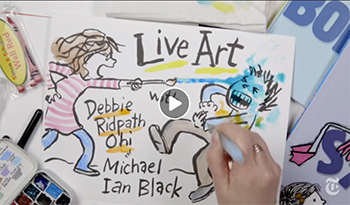Sunday
Apr082007
What's the difference between a 'bardic' and a 'chaos' circle?
Posted on  Sunday, April 8, 2007 at 8:12AM
Sunday, April 8, 2007 at 8:12AM
 Sunday, April 8, 2007 at 8:12AM
Sunday, April 8, 2007 at 8:12AM
Just to clarify, a "filk circle" doesn't necessarily have to be a circle, though it is usually shaped that way. A filk circle is a gathering of filkers who wish to make music together, to perform their own music, or a combination of both. Filk circles are generally informal, with everyone being invited to participate, unless otherwise explicitly stated, such as an official convention panel where only certain filkers are performing (with everyone else being in the listening audience).
ALSO SEE:
Welcome to the filk circle by Lee Gold.
Comments? Suggestions? Please post below.
Chaos filk circles
- In a chaos filk circle, there are no rigid "rules" about who gets to sing. People jump in with a song when they feel they have a good follower to a song that has just been performed, or when they feel like it.
Advantages:
Because filkers can "follow" with appropriate songs, there is a more natural ebb and flow to the atmosphere and energy in the room.
Disadvantages:
In large circles, the more aggressive or outgoing performers tend to be heard more often, and filk-hogging is more of a possibility. Less confident performers, those without instruments, or those sitting further back, are less likely to be able to "jump in" for their turn.
Bardic filk circles
- In a bardic filk circle, there is a regimented system to make sure that everyone who wants to sing gets a chance to sing. The simplest bardic system is just to go around the circle, one person at a time. Each person can pick, pass, or play. "Pick": pick a person to perform (if they're willing), or song for someone else to perform. "Pass": forfeit your turn. "Play": perform a song.
I've seen poker chips and coloured beads used in bardic circles, with each person being handed one chip or bead. If you want to sing (or pick or pass), you throw your marker into the center of the circle. You can't sing again until everyone has thrown in their marker.
Advantages:
Everyone who wants to sing gets a chance to sing, including shy or insecure performers who would not have the courage to jump in and sing in a chaos filk circle. There is no filk-hogging.
Disadvantages:
Some don't like the regimented system because of the inability to "follow" a song with a related one (the marker system helps in this regard). Also, the predictability of performance order tends to determine the comings and goings of filkers in the circle. It can be humiliating for a less confident filker to find half the people in the circle suddenly deciding to take washroom or chat breaks once they realize that his turn is next.
Phil Parker points out that the wait for one's turn to sing can be painfully long in large bardic circles. He adds: "One of the major reasons given for why chaos is bad is filk-hogging, but I see much more filk-hogging in bardic circles than in chaos circles. That's because the "pick" requests tend to be directed very strongly to a small number of performers, or in some cases, a single performer. In the bardic circle, there may not be any element of the hogs being pushy or nasty about it, but the end result is the same -- a few people get to sing a lot, and the rest hardly at all."
ALSO SEE:
Welcome to the filk circle by Lee Gold.
Comments? Suggestions? Please post below.
in  Basics
Basics
 Basics
Basics 








Reader Comments